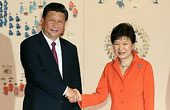
Chinese envoy says BRICS can regain rapid growth
Updated: 2014-05-12 04:08
By ZHANG FAN in New York (China Daily Latin America)
Comments Print Mail Large Medium SmallDespite the current slowdown in economic growth, BRICS countries still have great potential to regain rapid development through continuous social and economic reforms, said Chinese Ambassador to Brazil Li Jinzhang recently.
"Economic development has always been a process of ups and downs. BRICS countries have been rapidly developing for more than 10 years, maintained their growth momentum and become the world's economic growth engine. Though the current average growth rate of BRICS is slower, it still doubles that of developed countries," Li said at a seminar "Expectations for the 6th BRICS Summit" held on April 28 in Fortaleza, Brazil.
He said BRICS countries, including China, are actively carrying out reforms to change their development pattern, adjust their economic structure, stabilize their financial situation and promote innovation. "With such effort, I believe BRICS countries can regain their rapid development," Li said.
Brazil will host the 6th summit of the BRICS countries. Leaders of Russia, India, China and South Africa will join Brazilian President Dilma Rousseff on July 15 in Fortaleza. The first BRICS summit was in Russia in 2009.
The concept of BRICS countries first appeared in 2001, and the countries have become a major driver in the global economy, with an average economic growth-rate of 7.3 percent in 2011.
However, a recent report from the Organization for Economic Cooperation and Development predicts that rate will be only 5.3 percent this year and 5.7 percent in 2015, though still ahead of the world’s future overall economic growth-rate.
"The development will not be all plain sailing," said Li, who noted that the five countries faced various difficulties in the past year that have affected their economies. "Some people started to bad-mouth the group and worry that their development will not continue. I think this is rather unreasonable," he said.
Li said BRICS countries have "obvious" advantages in market, labor and natural resources, and that the countries are more capable of facing challenges and solving problems after years of development.
BRICS countries as a group account for 16 percent of global trade, according to the World Trade Organization, but bilateral trade among the five was only $336 billion in 2013, 1.5 percent of the global total.
"It shows that the potential of economic cooperation between BRICS has not been totally released," Li said, "BRICS should have enough confidence in each other. The future is still bright if we can have correct direction, apply effective measures, grasp the opportunities and work together."
China is Brazil's largest trade partner and also the largest export and import market. Trade volume between China and Brazil surpassed $90 billion in 2013.
"The rapid development of China-Brazil relations is a vivid microcosm of the mutual beneficial and win-win cooperation among BRICS countries. It also reveals the strong vitality and boundless co-operation prospects among emerging economies," Li said.
Li also praised Brazil's efforts to advance the BRICS countries'goals, especially reducing poverty, increasing environmental protection, governing the Internet and reforming international financial and trade institutions.
The Brazilian government held an international meeting on Internet governance in Sao Paulo in April and passed the "Netmundial Multistakeholder Statement". More than 1,400 representatives from 97 countries participated.




